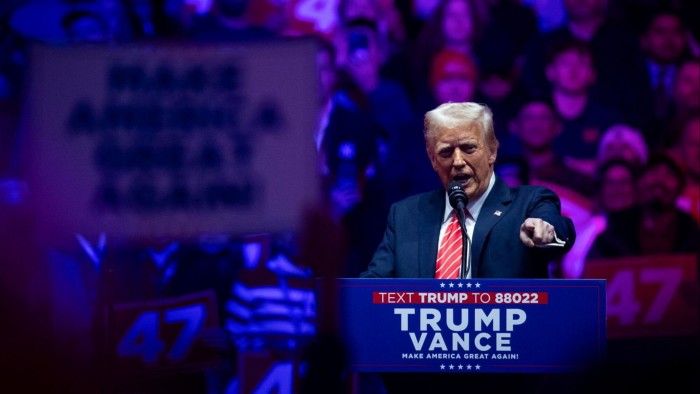Today’s agenda: Three Israeli hostages released; TikTok restores US access; Europol on Big Tech; shift in Davos agenda; and factions in the Republican party
Good morning. We begin in Washington, where Donald Trump and his team are finalising about 100 executive actions that he will sign in his first days in office as he rushes to enact his populist and nationalist agenda.
What’s in store: Details of the first blitz of executive actions were still under wraps at the weekend, but Trump and his top officials have already signalled what their priorities will be. The first measures by Trump, who has vowed to be a dictator “on day one” of his second term, are set to include curbing immigration, increasing tariffs and deregulating sectors ranging from energy to cryptocurrencies.
What’s behind the rush: Trump and his team aim to immediately reset US policy and start fulfilling some of the huge promises he made during the campaign to reverse many of Joe Biden’s actions. On the eve of his return to the White House, the president-elect held a rally where he vowed to act with “historic speed and strength” to end “American decline”.
Here’s more on what to expect as Trump is sworn in today.
-
Mind the gaps: The new administration will have to deal with a dispersion of economic outcomes at home and abroad, writes Mohamed El-Erian.
-
China trade: Biden has thrown down the gauntlet to the incoming president by concluding that China used non-market practices to dominate the maritime industry, writes Rana Foroohar.
As Trump returns to the White House, what will his second term mean for America and the world? Join leading FT journalists and their guests to gain critical insights into the next four years.
Here’s what else we’re keeping tabs on today:
-
Economic data: The EU releases updated third-quarter GDP and employment figures.
-
World Economic Forum: The annual gathering of global elites kicks off in the Alpine ski resort of Davos.
-
US: Financial markets are closed for Martin Luther King Jr Day.
Five more top stories
1. Israel’s military said three hostages held in Gaza had returned to Israeli territory as a long-awaited hostage and prisoner exchange deal began yesterday following 15 months of brutal conflict. Israel said Romi Gonen, 24; Emily Damari, 28; and Doron Steinbrecher, 31, were the first of dozens of captives due to be released as part of a fragile truce.
2. TikTok said it was restoring access to the video app after Donald Trump vowed that companies distributing and hosting the platform would not be held liable for violating a US ban that came into effect yesterday. The platform temporarily went dark in the US ahead of yesterday’s deadline requiring its Chinese owner to sell the app.
3. Technology giants must do more to co-operate with law enforcement on encryption or they risk threatening European democracy, according to the head of Europol, as the agency gears up to renew pressure on companies at the World Economic Forum in Davos this week. Read the full interview with Catherine De Bolle.
4. The UK government needs to act to stop sham self-employment if it wants its flagship overhaul of workers’ rights to succeed, warned the official charged with tackling labour exploitation. Margaret Beels told the Financial Times that employers could simply sidestep new obligations to their staff if ministers continued to delay legislation to clarify workers’ status.
-
More UK policy: Peers have blamed a surge in health-related benefit claimants on design flaws in the welfare system, rather than worsening health outcomes or long waits for treatment.
5. Exclusive: EY and PwC are on track to miss 2025 targets for female partner representation in the UK as the Big Four accounting firms struggle to sufficiently boost the proportion of women in their upper ranks. Audit firms have stepped up the number of women in top jobs in recent years, but raising the gender balance of partnerships towards parity has proved a slow process.
The Financial Times is back in Davos this week. Sign up to our daily events chaired by the team of senior FT journalists covering the meeting, who will provide on-the-ground analysis and expertise as the week unfolds.
The Big Read
While the incoming president enjoys stronger standing with the American public than at almost any time during his first term, Donald Trump also has a much more diverse political coalition to satisfy. The Republican party may be united in its loyalty to him, but it is now made up of groups that have very different world views and agendas. Here are the emerging party factions and the issues dividing them.
We’re also reading and listening to . . .
-
Britain’s fragile situation: The government must retain the confidence of its creditors and not adopt policies that raise doubts about its good sense, writes Martin Wolf.
-
Electric vehicles: Carmakers expect to deliver more than 160 models to the European market this year, but regulatory costs and discounting could hit profits, warn executives.
-
The Economics Show🎧: Alan Beattie talks to Doug Irwin, economics professor at Dartmouth College, about what Donald Trump wants on trade.
Chart of the day
Donald Trump has threatened the EU with a trade war unless it buys more US oil and gas. But despite Brussels signalling openness to the idea, it has no power to buy — and European countries are importing record volumes of cheaper liquefied natural gas from Russia.
Take a break from the news . . .
Wealthy managers are increasingly isolated from the less well-off at work, and that could have profound political consequences. Researchers suggest the isolation of elites at work may have already helped breed resentment among poorer workers who read about the lives of top earners but rarely meet them, writes Pilita Clark.
Read the full article here

